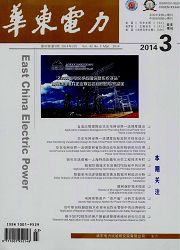

 中文摘要:
中文摘要:
针对梯级水电站与火电联合调度难度大、约束多的困难,考虑了节能、减排及梯级蓄能等三个目标,并引入模糊理论建立多目标水火电优化调度的模糊模型,采用最大化满意度指标法将多目标转化为单目标优化,然后通过遗传算法求解此问题。结果表明,相较于纯火电优化调度,梯级水火电调度能有效节约能源,减少污染气体排放;在此基础上多目标的水火优化调度比单目标的水火优化调度更能同时兼顾节能、减排及水电站的蓄能,达到社会综合效益最大化。
 英文摘要:
英文摘要:
The joint scheduling of cascade hydro-thermal power is difficult and multi-constrained, therefore a multiobjective fuzzy scheduling model is presented based on fuzzy theory, considering the three objectives: energy saving, emission reducing and cascade energy storage. The maximum satisfaction index method is adopted to reformulate the multi-objective problem into an optimized single-objective problem, which is solved by genetic algorithm. It has been demonstrated that the optimal scheduling of cascade hydro-thermal power can have better effects on energy saving and emission reduction than that of thermal power; the proposed multi-objective optimal hydro-thermal power scheduling model can take energy saving, the emission reduction and cascade energy storage into better account and achieve the maximized social comprehensive benefits than the single-objective scheduling.
 同期刊论文项目
同期刊论文项目
 同项目期刊论文
同项目期刊论文
 The Preparation and Characterization of Amphiphilic Star Block Copolymer Nano Micelles Using Silsesq
The Preparation and Characterization of Amphiphilic Star Block Copolymer Nano Micelles Using Silsesq Frequency effect on p-nitrophenol degradation under conditions of strict acoustic and electric contr
Frequency effect on p-nitrophenol degradation under conditions of strict acoustic and electric contr Syntheses of silsesquioxane (POSS)-based inorganic/organic hybrid and the application in reinforceme
Syntheses of silsesquioxane (POSS)-based inorganic/organic hybrid and the application in reinforceme Studies on core-shell structural nano-micelles based on star block copolymer of poly(lactide) and po
Studies on core-shell structural nano-micelles based on star block copolymer of poly(lactide) and po Grafting Polymerization of N-isopropylacrylamide on the Surfaces of Silica by ATRP and Its Applicati
Grafting Polymerization of N-isopropylacrylamide on the Surfaces of Silica by ATRP and Its Applicati Degradation of Sodium Polystyrene Sulfonate and the Radical Initiated Polymerization of Styrene Unde
Degradation of Sodium Polystyrene Sulfonate and the Radical Initiated Polymerization of Styrene Unde 期刊信息
期刊信息
